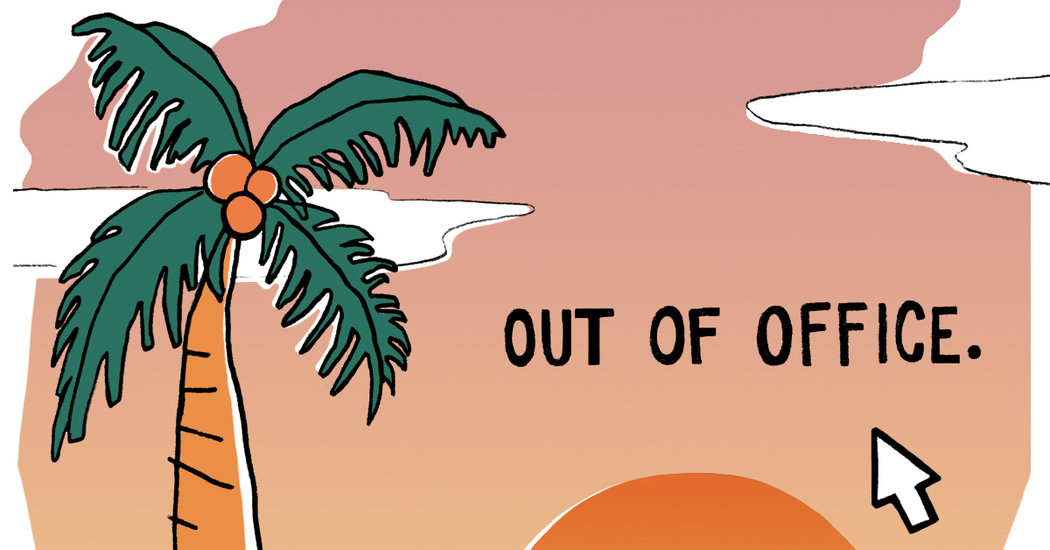
When Lisette Sand-Freedman, 42, took a four-day family trip to the Dominican Republic in February, she chose her out-of-office email message carefully.
“In case of emergency, please call 911” was what rolled into the inboxes of chief marketing officers, publicists and celebrities who were trying to reach Ms. Sand-Freedman, the chief executive of Shadow, a marketing and communications agency with offices in New York and Los Angeles. Her goal had been to offer a moment of levity and remind her contacts to pause and rethink their definitions of urgency.
The short note triggered responses like, “You go girl!”, “It’s about time” and “This made my day.” (Because Ms. Sand-Freedman is always on call — she said she receives “hundreds” of emails daily — her staff even posted the OOO on their Instagram accounts.)
But not everyone feels so bold and free. The flexibility of email personalization is dictated by one’s career, institution and job title.
“It depends on the company, the culture and who their customers are,” said Vivian Garcia-Tunon, owner of VGT Consulting Group, an executive coaching business in midtown Manhattan. Ms. Garcia-Tunon has worked as a human resources leader in financial services, private equity, and investment banking, and noted that the communication differences at creative and conservative businesses are vast. Her client Brunch, a web design and development studio in Washington, D.C., can be sassier than banks she works with, such as Capital One. “They can’t be too edgy, because that’s when people get scared,” she said.
It’s important for individuals to remember their audiences and what the implications are, Ms. Garcia-Tunon said: “If they’re trying to be a smartass, they need to make sure they’re comfortable in the risky approach and the consequences of their messages.” To avoid drama, she advises asking the office what it considers appropriate.
Or employees can simply follow the leader. Erich De Oliveira, 41, of Marlborough, Mass., first encountered custom vacation memos two and a half years ago when he began working for Simply Business, an online business insurance brokerage in Boston.
“Some of the out-of-office messages were really around ‘Hey, I’m going to be at the beach with my family and my children, so unless you’ve got something more important than that, I’m probably not going to be available for you’,” said Mr. De Oliveira, recalling a C-suite executive’s OOO email. “It highlights the value of what’s important to each person. For that person, it just happened to be their family.”
Since then, Mr. De Oliveira, a chief customer officer, has crafted original, quirky greetings to indicate he is not available. Within days of this year’s “Game of Thrones” season premiere, his contacts received a timely notification:
“Thanks for your email but I’m out of office. My family is headed up north with a supply of dragonglass for our friend, Jon Snow. If we have time, we’ll likely go beyond the wall, but not sure yet. So while we go and do that, I will not have my phone or computer with me (terrible reception beyond the wall anyway).”
Regardless of attitude and approach, many businesses develop templates to keep the tone consistent among automated emails. Organizations can hire consultants to construct these, too. “We’ll create canned responses for everything, and then the team members can pull what’s appropriate. It’s the company’s fingerprint or the leaders’ fingerprint,” said Susie Carder, a profit and business coach in San Diego whose clients include doctors, attorneys, salons and advertising companies. “What they’re saying in their communication affects their brand in a positive or negative way.”
Ms. Sand-Freedman knows this all too well, and she dialed it down a bit from her emergency message for a trip with her girlfriends to Miami this past April.
“Spring Break. Until Monday, April 8th. In case of emergency, please call one of the 50 other SHADOWS that work here,” read her OOO, neatly conjuring an image of attentive colleagues.
“Every form of communication should truly serve a purpose,” Ms. Sand-Freedman said.







